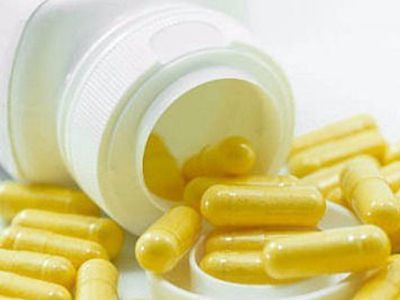Botanical Allies for Allergies: Quercetin
Despite the amount of information that exists today about how to eat a balanced diet, there is still so much to discover about healing foods and botanical medicines that can help us be healthy or provide therapeutic support when we are sick. Among the not so well-known is quercetin, a pigment found in many plants, fruits, and vegetables that provides us with many healing benefits1.

Quercetin is a type of flavonoid antioxidant that’s found in common plant foods, including onions, leafy greens, tomatoes, berries, grapes, broccoli, and even red wine. It’s technically considered a “plant pigment,” which is why it’s found in deeply colored, nutrient-packed fruits and vegetables2. This natural compound is tied to what many of us seek with our health goals: a longer life, better quality of life, increased energy, heart and brain health, immune resilience, and more. In addition to increasing our intake through select foods, we can also consume quercetin as a dietary supplement3.
Let’s explore some of quercetin’s healing properties and benefits:
1. Provides Antioxidant Protection
Quercetin stands out for its antioxidant properties. Antioxidants are molecules that help defend your cells against damage from free radicals. Damage caused by free radicals is linked to aging, as well as cancer and other harmful diseases. Quercetin has more antioxidant power than vitamin C and E, even beta-carotene!4
2. Offers Neuroprotective Benefits
Quercetin can help prevent neurodegenerative diseases, such as Alzheimer’s or Parkinson’s disease, through its ability to defend the brain against oxidative stress and inflammation. Oxidative stress contributes to the development of neurodegenerative diseases, occurring when there is an imbalance of free radicals in the body5,6.

3. Provides Anti-Inflammatory Support
Inflammation is the body’s natural healing response to stress and injury. However, chronic inflammation can be harmful to the body and is considered the root of most diseases, including heart disease, cancer, cognitive decline, and autoimmune disorders. According to recent studies, quercetin prevents acute and chronic inflammation and has anti-arthritic effects too7.
4. Relieves Allergy Symptoms
Studies suggest that quercetin is an effective antihistamine, even helping to treat ailments such as asthma and bronchitis. As a natural antihistamine and an anti-inflammatory, quercetin can help lower the effects of seasonal and food allergies, plus asthma and skin reactions. Thanks to its anti-inflammatory effects, it prevents the respiratory tract from becoming inflamed8.
5. Prevents Infections
In addition to the properties already outlined, quercetin is also an effective antibacterial -- especially against those bacteria related to the digestive system, the skin, the respiratory system, and the urinary tract9,10.
6. May Help Reduce Cancer Risk
Quercetin contains anticancer properties that might help prevent the spread of cancer cells and tumor growth. Scientific studies have shown that a diet rich in flavonoids, such as quercetin, can help prevent cancer. Fruits and vegetables are full of flavonoids, so increasing your intake of these foods could lower your risk of many types of cancer11.

7. Reduces the Risk of Heart Disease
According to a study by the American Heart and Stroke Association, taking quercetin supplements could be an effective way to lower blood pressure. Other research shows that overweight individuals that took quercetin supplements had lower levels of bad cholesterol as well as reduced systolic blood pressure. Various scientific works have revealed that quercetin can improve the health of blood vessel cells and blood flow through the arteries in people with heart disease12.
Eating & Supplementing with Quercetin
Quercetin can be obtained by eating a variety of fruits and vegetables in your diet – try to eat all colors everyday. Onions have the highest level of quercetin compared to other products, with about 300 mg per kilogram. But who wants to eat that many onions! Go for the fruits or other veggies. Or for even more support, consider finding a quercetin complex supplement formula that also contains vitamin C, nettles, and bromelain for synergistic effects. Our founder suggests at least 350 mg of supplemented quercetin daily.
To read more about the extraordinary benefits Quercetin has to offer for our health, visit our founder’s blog.
Join the Mederi Center community by signing up for our email list! We send several emails a month with product promotions for patients, practical tips for healthy living, blogs written by our practitioners, information about events, and other news. You can unsubscribe at any time.
Learn more about becoming a patient >>
References
- Azeem M, Hanif M, Mahmood K, Ameer N, Chughtai FRS, Abid U. An insight into anticancer, antioxidant, antimicrobial, antidiabetic and anti-inflammatory effects of quercetin: a review. Polym Bull (Berl). 2022 Jan 30:1-22.
- Mlcek J, Jurikova T, Skrovankova S, Sochor J. Quercetin and Its Anti-Allergic Immune Response. Molecules. 2016 May 12;21(5):623.
- Andres S, Pevny S, Ziegenhagen R, Bakhiya N, Schäfer B, Hirsch-Ernst KI, Lampen A. Safety Aspects of the Use of Quercetin as a Dietary Supplement. Mol Nutr Food Res. 2018 Jan;62(1).
- Xu D, Hu MJ, Wang YQ, Cui YL. Antioxidant Activities of Quercetin and Its Complexes for Medicinal Application. Molecules. 2019 Mar 21;24(6):1123.
- Khan H, Ullah H, Aschner M, Cheang WS, Akkol EK. Neuroprotective Effects of Quercetin in Alzheimer's Disease. Biomolecules. 2019 Dec 30;10(1):59.
- Tamtaji OR, Hadinezhad T, Fallah M, Shahmirzadi AR, Taghizadeh M, Behnam M, Asemi Z. The Therapeutic Potential of Quercetin in Parkinson's Disease: Insights into its Molecular and Cellular Regulation. Curr Drug Targets. 2020;21(5):509-518.
- Li Y, Yao J, Han C, Yang J, Chaudhry MT, Wang S, Liu H, Yin Y. Quercetin, Inflammation and Immunity. Nutrients. 2016 Mar 15;8(3):167.
- Jafarinia M, Sadat Hosseini M, Kasiri N, Fazel N, Fathi F, Ganjalikhani Hakemi M, Eskandari N. Quercetin with the potential effect on allergic diseases. Allergy Asthma Clin Immunol. 2020 May 14;16:36.
- Wu W, Li R, Li X, He J, Jiang S, Liu S, Yang J. Quercetin as an Antiviral Agent Inhibits Influenza A Virus (IAV) Entry. Viruses. 2015 Dec 25;8(1):6.
- Farhadi F, Khameneh B, Iranshahi M, Iranshahy M. Antibacterial activity of flavonoids and their structure-activity relationship: An update review. Phytother Res. 2019 Jan;33(1):13-40.
- Reyes-Farias M, Carrasco-Pozo C. The Anti-Cancer Effect of Quercetin: Molecular Implications in Cancer Metabolism. Int J Mol Sci. 2019 Jun 28;20(13):3177
- Marunaka Y, Marunaka R, Sun H, Yamamoto T, Kanamura N, Inui T, Taruno A. Actions of Quercetin, a Polyphenol, on Blood Pressure. Molecules. 2017 Jan 29;22(2):209.


